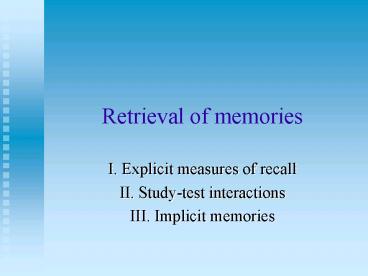Retrieval of memories - PowerPoint PPT Presentation
1 / 20
Title:
Retrieval of memories
Description:
TOT words recalled better than non-TOT words when primed with the initial letter ... Primed memory (cued recall and word completion) are not affected, however. ... – PowerPoint PPT presentation
Number of Views:51
Avg rating:3.0/5.0
Title: Retrieval of memories
1
Retrieval of memories
- I. Explicit measures of recall
- II. Study-test interactions
- III. Implicit memories
2
I. Are the memories there?
- Retrieval is the third of Atkinson Shiffrins
control processes that are under an individuals
control, along with rehearsal and coding. - Nelson (1978) and savings
- Learn paired associates, such as 43-dog
- Wait until both recall and recognition memory
fail - Measure trials to learn 43-dog vs. 43-house
- Is all forgetting retrieval failure?
3
Why is recognition memory easier than recall
memory?
- Cued recall vs. free recall
- Access to cues as category labels Tulving and
Psotka (1971) - Recognition memory two context cues
- Recall memory One context cue
4
Recall vs. recognition Memorize the following
words
- then that also list each
- word more just much need
- call them ones food only
- sofa eggs cats test dart
- duck pill scat miss free
5
Recognition test Select the words from the
following list
- too good they also free more
- tend that there just test
holy - word much call ones each then
- dogs into eggs spill dart list
- that need thou them food hats
- only sofa will cats pill
duck - sips scat mister stuck unto miss
6
Mnemonic methods
- Generate-recognize Stories
- Pegword method
- Cue reliability is crucial
- Method of loci
- Organization
- Generation effect
- Imagery
7
Is recognition easier than recall?
- Mnemonic methods affect recall more than
recognition. - Intentional memory shows a similar effect
relative to incidental memory. - The difference is due to the availability of cues
and the difficulty of the distractors.
8
II. Study-test interactions
- Context-dependent memory
- State-dependent memory
- Mood-dependency and mood-congruency
- Encoding-specificity hypothesis (Tulving, 1975)
- Memories are associated to specific cues.
- Memory is best if the learning cues are present
at test.
9
A different model
- The variants on the encoding-specificity
hypothesis focus on cues. - Bransfords transfer-appropriate processing
focuses on processes rather than cues. - Semantic associates vs. phonetic rhymes
- Target word run
- Study jog-run vs. bun-run
- Test race-? vs. sun-?
10
Morris, Bransford Franks (1977) results
- 1. Semantic processing (race-?) showed better
recall. - 2. Recall was better when test process matched
study process than when study and test processes
were reversed.
11
Reconstructive and inferential memory
- We infer what we cannot recall about a story from
what we can recall. - As we make inferences, we engage in elaborate
processing. - As the elaborately processed inferences are
available at recall, we benefit from
transfer-appropriate processing. - Elaboration must happen while learning.
12
A danger in inferential processing
- Once we process inferences, we find it difficult
to remember whether an item was actually studied
or inferred a sort of positive transfer. - Intrusions can be added at test (Helen Keller)
- Failure to distinguish inferences from
experiences distorts eyewitness testimony and
clinical recollection. - DID and inferred abuse experiences
13
III. Explicit vs. implicit memory
- The remember/know paradigm (Gardiner, 1988)
- Feeling of knowing/ Tip-of-the-tongue
- Accurately predicts eventual recognition
- TOT words recalled better than non-TOT words when
primed with the initial letter - TOT words have a shorter tachistoscopic threshold
- Jeopardy effect
- Hit the buzzer in 1.7 sec, begin answer in 2.5
sec - Feeling of knowing is 90 accurate.
- This is an example of implicit memory.
14
Familiarity and the brain
- Recognition may be based on perceptual memory
rather than episodic memory. - Recall Jon, who experienced damage to his
hippocampus at age 4 and lost the ability to form
new episodic memories. - Intriguingly, Jons recognition memory for
episodic information was not damaged. - ERPs at 400 msec for familiarity (recognition),
and at 600 msec for knowing (recall). - Jon showed 400 msec ERPs, but no 600msec ERPs.
15
Familiarity
- Experiencing an item creates record strength
- Items with record strength are subjectively
familiar - Familiarity speeds recognition of targets
- Familiarity slows rejection of distractors
- Familiarity breeds false alarms
- Familiarity increases belief Mere exposure
effect and propaganda
16
Priming effects
- Prior exposure increases retrieval accuracy
- Priming helps implicit memory more than explicit
memory - Priming may strengthen records without
strengthening associations
17
Procedural memory
- Effective solutions without conscious processing
- Procedural knowledge without declarative
knowledge - Motor memory Typewriter keyboard
18
Amnesia
- Brain damage areas
- Cortex Specific agnosias
- Hippocampus Anterograde amnesia
- Surgery cases H.M.
- Alzheimers disease
- Korsakoffs syndrome
19
Selective amnesia
- Hippocampal damage produces anterograde amnesia
for free recall - Primed memory (cued recall and word completion)
are not affected, however. - Procedural learning is better than declarative
learning - Hippocampal damage mainly affects explicit,
declarative memory - Conditioning is unaffected, although patients
with amnesia cannot recall the experiences of
conditioning.
20
Bransford Franks results
0.4
Semantic test
0.3
Proportion of words recalled
0.2
Rhyme test
0.1
Semantic
Rhyme
Study Condition































